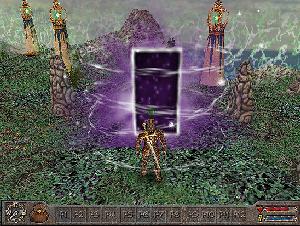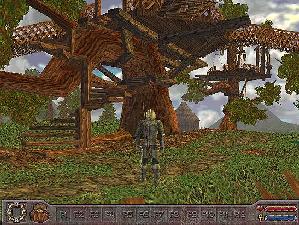“Dupre, Dupre, where hast thou gone? Shall the people rejoice and pay homage
to their new… Guardian?”
Years ago on Serpent Isle, your companion Dupre sacrificed himself to save
Britannia from evil. In doing so, he ended one of the greatest chapters in PC
gaming, Ultima VII. Soon after, the Guardian transported you to the world
of Ultima VIII: Pagan where you, the Avatar, languished in inappropriate,
arcade-like gameplay that hardly fitted your past exploits.
Years have passed. Much work has been done to transport you once again to
Britannia to finish your final quest, to vanquish the Guardian, and to unite
you with Britannia in a far more intimate and immersive way.
But it seems that the Guardian’s influence is not limited only to fantastical
realms. Somehow, his evil leaked into our world and ordered the premature delivery
of the product of all those years’ work. Now, the Avatar must face his most
difficult task. Not only must he save Britannia, but also he must conquer a
nation of gameplay bugs and Olympian system requirements to do so. Poor Avatar
– the odds are not in his favor.
Things
in Britannia have taken a turn for the worst. In your absence, the Guardian,
red-skinned champion of evil conquests, has made eight huge columns leap from
the soil, corrupting the eight Virtues of which you are the Avatar. It is indeed
a dark time, and Britannia needs a hero. In your luxurious estate, you are awoken
by a mysterious voice that bids you to arm yourself and venture forth into the
night. It tells you to seek the gypsy who determines which of the 8 Virtues
your path follows and sends you through the moongate to Britannia. From there,
one of the most ambitious, stunning, expertly designed (and even more expertly
sabotaged) games you’ll ever encounter starts off on an epic quest. For this
adventure, you are advised to pack plenty of Zantac, as frustration shall be
your constant ration.
Ultima IX Ascension is an important game. It is the conclusion of the
Ultima series, one of the longest running and most widely respected role-playing
series on the PC, and it is also the last single player game that Origin systems
will ever release. So it is a pity that the entire game will most likely be
known not for its splendid design, gripping plot, or rich atmosphere, but rather
as an example of what’s wrong in the gaming industry.
First, what is right. The gaming system in Ultima IX is just about
as good as it gets. Playing from an isometric 3D perspective, you control the
Avatar on his quest through Britannia. The interface is similar to the previous
games, with a backpack for storage, spell-book for casting, and a compass for
navigation. New to Ultima IX is a toolbelt for quick weapon equipping,
using potions, etc. The mouse is used for controlling the viewpoint, but whenever
an item is picked up, the old mouse interface for moving objects with the little
“hand” is still there. All in all, the interface feels like Ultima VII drawn
out into a 3D perspective. Although it would be nice to be able to re-configure
the controls, the system is nonetheless seamless and intuitive.
The 3D perspective was thought to be a gamble when it was first announced,
but the result is clearly a more immersive game. You really feel a connection
with Britannia as a gamer. Ultima IX is a shining example of how successful
the synergy of adventuring, fighting, and character development can be.
Once you get into the game, Ultima IX really shows its charms. Although
at first your path is clearly set and your spell-casting and combat options
are limited, your abilities flower as the game unfolds. As you vanquish the
columns, you gain more spells related to the Virtue that each individual column
is corrupting. Your combat options can be expanded with training, and the places
to go, people to talk to, and things to do become more and more plentiful. In
fact, there are at least 40-50 hours of side quests and things to do that aren’t
essential to the plot. This open-ended gameplay allows you to further explore
Britannia, collect useful items (though none as slick as Ultima VII‘s
“Hoe of Destruction”), and just generally have a deeper playing experience.
And that is on top of about 70 hours of straight, plot-based gameplay.
As all this happens, the excellent plot of the game unfolds to the absolute
delight of the player. Ultima IX draws you in with a great story, a good
interface, terrific gameplay, and graphics that, under proper conditions, create
the mysterious and enchanting world of Britannia with more success than perhaps
any game has ever had at creating its setting.
 Given
Given
the rich back-story and enticing plot, the sense of awe you feel as you walk
up to the fallen head of an ancient statue or venture to a tree-village that
would put Endor to shame is nothing short of breathtaking. Britannia is brought
to life by a powerful 3D engine that creates rich, expansive, colorful, and
believable scenery. That is, assuming you can run it.
Though this review has been waxing lyrical on the excellent play aspects of
Ultima IX, it is with great sadness that the great game design, excellent
production values, and fantastic gameplay is so thoroughly sabotaged by the
largest collection of fatal bugs that PC gaming has seen in a major release
since Battlecruser 3000 AD.
For starters, unless you have a fast system with plenty of RAM and an AGP
Voodoo 3 based card, Ultima IX will be an exercise in graphical choppiness.
The bugs are so bad they would reduce even the most proud Althon-750-with-GeForce256-512MB-of-RAM-owning-gamer
to tears and curses. Although the Glide (3dfx Voodoo) support is reasonable,
Direct 3D, which most cards use, is an utter mess of lousy performance and curtailed
visual appeal.
Beyond that, save games get corrupted, crashes are routine, the AI performs
erratically, quest specific bugs often halt your progress, and some nasty memory-leaks
make the game run slower the longer you play it. A RPG is supposed to be the
sort of game you become engrossed in for hours. Here, it’s a miracle if you
can play for 15 minutes and be able to save your game before the onslaught of
the blue error-screen-of-death.
Given that the first patch was dated before the game was released, it’s evident
that Ultima IX was released in Beta form (before the developers were
finished with it) in order to get on store shelves for the Christmas season.
Score another one for the evil suits.
Ultima IX is the legacy of gaming companies focusing more on the dollar
than the quality of the product: an ‘A’ game murdered by an ‘F’ game’s bugs.
As this is the last single player game that Origin will ever release and the
end of the Ultima series, it should have been a swan song. In our preview,
we stated that Ultima IX was “destined to be a classic,” and if they
can ever manage to fix it… it still is. If you’re interested, wait until the
game is fully patched or wait for the inevitable ‘Gold Version.’ By then, the
problems should be solved. Until then, the day this game was released prematurely
lives in infamy in PC gaming history. Some things in gaming are sacred – Ultima
was one of them. Don’t give up on it quite yet, but for now… the Guardian
has won.

-
Fantastic Gameplay
-
Excellent Design
-
Astonishing Graphics
-
Epic Plot
-
A Mountain of Bugs
-
Which Ruins Everything
-
This is Capitalism Gone Bad







